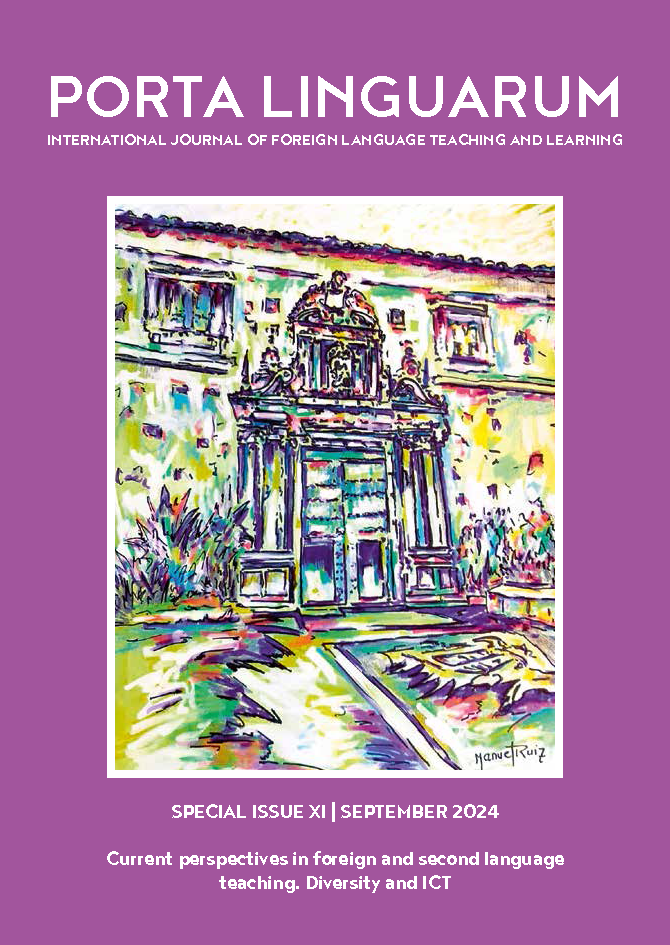Decoding idiom change: Root form and frequency analysis of transformed idioms in American mass media
DOI:
https://doi.org/10.30827/portalin.viXI.31185Keywords:
idioms, transformed idioms, mass media, corpus, COCA, Sketch Engine, Ngram Book Viewer, dictionaryAbstract
This paper examines the evolution of three idioms – ‘seen better days’, ‘spill the beans’ and ‘kill two birds with one stone’ – and their transformations within the landscape of American mass media. Drawing upon a vast collection of examples from newspapers, magazines, television programs and social media platforms, this article provides an extensive analysis of linguistic transformations and their cultural implications. The occurrences of both the original and the transformed idioms, their frequency and their contextual usage were all analyzed utilizing resources such as COCA, Sketch Engine, Ngram Book Viewer and dictionaries. The findings offer researchers and professional linguists valuable insights into the evolution of the English language, which could have an impact on professional training globally.
Downloads
References
Аimagambetova М. М. & Suleimenova E. (2017). The transformation of phraseological units in the headline constructions. Man in India 97(21):331-344
Baddorf, D. S. & M. W. Evens (1998). Finding phrases rather than discovering collocations: Searching corpora for dictionary phrases. In Proc. of the 9th Midwest Artificial Intelligence and Cognitive Science Conference (MAICS'98), pp. 339-364.
Burger, H. (1998). Phraseologie. Eine Einführung am Beispiel des Deutschen. Berlin: Erich Schmidt Verlag.
Cignoni, L., Coffey, S., & Moon, R. (1999, December 31). Idiom variation in Italian and English. Languages in Contrast. https://doi.org/10.1075/lic.2.2.08cig
Colston H., Gibbs R.A brief history of irony//Irony in language and thought: A congitive science reader.-2007.C.3-21
Dronov, P. (2010). Vvod adektivnogo opredeleniya v strukturu idiomy: o semantcheskoj obuslovlennosti leksiko-sintaksicheskih modifikacij idiom (na materiale russkogo, anglijskogo i nemeckogo yazykov). Avtoreferat dissertacii na soiskanie uchenoj stepeni kandidata filologiþeskih nauk [Introduction of adjectival definition into the structure of an idiom: on the semantic conditioning of lexical-syntactic modifications of idioms (based on the material of Russian, English, and German languages). Abstract of the dissertation for the degree of Candidate of Philological Sciences]. Moskva: Institut russkogo yazyka im. V.V. Vinogradova
Espinal M. T., Mateu J. Idioms and phraseology //Oxford research encyclopedia of linguistics. – 2019.
Fomenko, O. (2023). Of Mice and Men: PETA’s Animal-Friendly Idioms as a Strategy Against Speciesism?. Acta Linguistica Lithuanica, (88), pp. 165-180.
Fraser, B. (1970). Idioms within a transformational grammar. Foundations of Language, 6, 22–42.
Gläser, R. (1986). Phraseologie der englischen Sprache. Tübingen: Niemeyer.
Granger, S. & F. Meunier (Eds.). (2008). Phraseology: An interdisciplinary perspective. John Benjamins Publishing.
Jackendoff R., Aaron D. More than cool reason: A field guide to poetic metaphor by George Lakoff and Mark Turner //Language. – 1991. – Т. 67. – №. 2. – С. 320-338.
Khalis, H. A. M. D. I. & H. I. B. R. I. Y. A. T. U. L. Rifhan (2019). The isolation of lexical item ‘tea’ from ‘spill the tea’ among Malay Twitter users. Jurnal Melayu, 18(2), pp. 219-230.
Komala, A. R., T. Rahayu, G. O. K. Nisa & S. Nurbayani (March 2022). Spill The Tea Phenomenon in Social Media as a Medium of Revictimization of Sexual Violence. In 2nd World Conference on Gender Studies (WCGS 2021), pp. 16-20. Atlantis Press.
Kunin, A. (1964). Osnovnye ponâtiâ anglijskoj frazeologii kak
lingvistiþeskoj discipliny i sozdanie anglo-russkogo frazeologiþeskogo slovarâ. Avtoreferat dissertacii na soiskanie uþënoj stepeni doktora filologiþeskih nauk. Moskva: Moskovskij gosudarstvennyj pedagogiþeskij institut inostrannyh âzykov im. Morisa Toreza.
Lakoff G., Johnson M. The metaphorical logic of rape //Metaphor and symbol. – 1987. – Т. 2. – №. 1. – С. 73-79.
Mourão, R. R., & Chen, W. (2019, October 18). Covering Protests on Twitter: The Influences on Journalists’ Social Media Portrayals of Left- and Right-Leaning Demonstrations in Brazil. The International Journal of Press/Politics. https://doi.org/10.1177/1940161219882653
Moon, R. (1998). Fixed Expressions and Idioms in English: A Corpus-Based Approach. Oxford University Press.
Naciscione, A. (2010). Stylistic use of phraseological units in discourse. John Benjamins Publishing Company.
Natsir M. et al. Language Change in Social Media (Instagram) //Randwick International of Social Science Journal. – 2020. – Т. 1. – №. 2. – С. 394-401.
Nunberg G., Sag I. A., Wasow T. Idioms //Language. – 1994. – Т. 70. – №. 3. – С. 491-538.
Omazic, M. (2008). Processing of idioms and idiom modifications: A view from cognitive linguistics. Sylviane Granger, Fanny Meunier, eds. Phraseology: An Interdisciplinary Perspective. Louvain-la-Neuve, 13-15 October 2005. Vol. 1. Amsterdam – Philadelphia: John Benjamins, pp. 81–94.
PETA TeachKind. (n.d.). Animal-friendly idioms lesson plans & activities. Retrieved from peta.org/teachkind/lesson-plans-activities/animal-friendly-idioms/.
Parkinson, Dilys, ed. (2006). Oxford Idioms Dictionary for Learners of English. (Second edition). Oxford: Oxford University Press.
Rafatbakhsh, E. & A. Ahmadi (2019). A thematic corpus-based study of idioms in the Corpus of Contemporary American English. Asian-Pacific journal of second and foreign language education, 4(1), 11.
Shakespeare’s influence. (2024, May 3). Wikipedia. https://en.wikipedia.org/wiki/Shakespeare%27s_influence
Siefring J. (ed.). The Oxford dictionary of idioms. – OUP Oxford, 2005.
Vrbinc, A & M. Vrbinc (2011).Creative use of idioms in satirical Magazines. Jezikoslovlje,12(1),pp.75-91.
Wasow T. Remarks on grammatical weight //Language variation and change. – 1997. – Т. 9. – №. 1. – С. 81-105.
Weinreich U. Problems in the analysis of idioms //Substance and structure of language. – 1969. – Т. 23. – №. 81. – С. 208-26



















